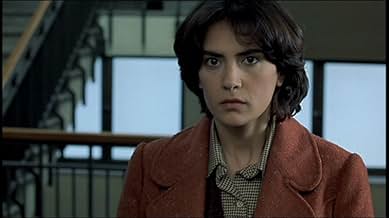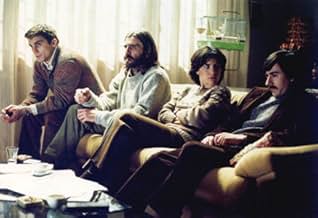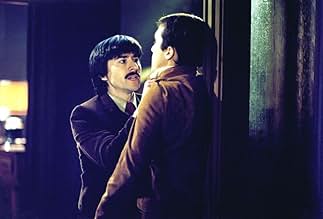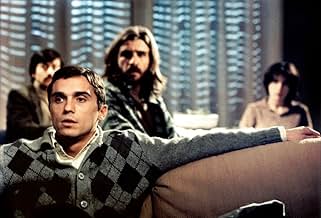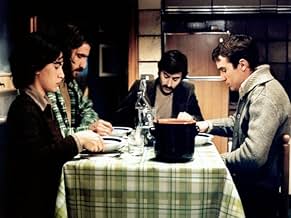Buongiorno, notte
- 2003
- 1 घं 46 मि
IMDb रेटिंग
7.1/10
4.2 हज़ार
आपकी रेटिंग
अपनी भाषा में प्लॉट जोड़ेंThe 1978 kidnapping of politician Aldo Moro as seen from the perspective of one of his assailants: a conflicted young woman in the ranks of the Red Brigade.The 1978 kidnapping of politician Aldo Moro as seen from the perspective of one of his assailants: a conflicted young woman in the ranks of the Red Brigade.The 1978 kidnapping of politician Aldo Moro as seen from the perspective of one of his assailants: a conflicted young woman in the ranks of the Red Brigade.
- पुरस्कार
- 13 जीत और कुल 21 नामांकन
Giulio Bosetti
- Paolo VI
- (as Giulio Stefano Bosetti)
फ़ीचर्ड समीक्षाएं
I've read the other comments on this board and I would like to precise that Aldo Moro at the time was not the Italian President and that obviously the Red Brigades were out for his blood because he was working skilfully at a compromise between the Christian Democrats and the Communists and that meant for the extremists of the left to be cut out from any kind of power or hold they might have on the Government. The film itself does not seek to give political answers and is much more concerned with the human aspects of the drama. It's more lyrical than realistic... if you're looking for action or for a docudrama, you should probably go elsewhere.
The events bookending this movie are true, but the actual story is pure speculation...thus leaving the door wide open for the storytelling.
Communist Catholics are an oddity...the contradictions in that appellation alone are manifest. So what we have here is told somewhat in the manner of a Passion Play, cross-pollinated with a critique vs. defense of the Marx-Hegel "Holy Family"...the argument centers on the captive's immediate concern about execution, whereas the captors insist on demonstrating they are merciless.
The problem is, all of this seems to be going on as if there's no outside world of concern...oh, we get leakage in from TV and newspapers, but no sense that Rome is under lockdown. This ends up totally alienated from the central symbolism (Mora's body having been found precisely halfway between the respective Christian Democrats' and Italian Communist Party's headquarters). We're locked behind the writing (the stacks of books, and simultaneously, Chiara within the library), then left for dead with no spatial, political or symbolic context.
That said, there is some cleverness in the limitation placed on Chiara, who is the only one who can tell the story outside the apartment, but has a proximity barrier from the writer at the cubicle door and peephole. Upon reaching perigee, she is reduced to defiant tears. Note also how she dreams in Soviet-era propaganda films!
Communist Catholics are an oddity...the contradictions in that appellation alone are manifest. So what we have here is told somewhat in the manner of a Passion Play, cross-pollinated with a critique vs. defense of the Marx-Hegel "Holy Family"...the argument centers on the captive's immediate concern about execution, whereas the captors insist on demonstrating they are merciless.
The problem is, all of this seems to be going on as if there's no outside world of concern...oh, we get leakage in from TV and newspapers, but no sense that Rome is under lockdown. This ends up totally alienated from the central symbolism (Mora's body having been found precisely halfway between the respective Christian Democrats' and Italian Communist Party's headquarters). We're locked behind the writing (the stacks of books, and simultaneously, Chiara within the library), then left for dead with no spatial, political or symbolic context.
That said, there is some cleverness in the limitation placed on Chiara, who is the only one who can tell the story outside the apartment, but has a proximity barrier from the writer at the cubicle door and peephole. Upon reaching perigee, she is reduced to defiant tears. Note also how she dreams in Soviet-era propaganda films!
The true story of the kidnap of Italian political leader Aldo Moro by the Red Brigades in 1978 is turned into a haunting, disturbing tone poem of s film.
Eschewing realism, or the obvious tense, linear approach, this focuses on the experience through the eyes of one the young kidnappers, and her ever growing doubts about the righteousness of the mission. But rather than express this literally, we see it emerge in dream sequences, and behind her eyes.
Beautifully shot, with a terrific use of classical and modern music (Pink Floyd shows up more than once) this quiet nightmare of a film is far more effecting and thought provoking than most political dramas. It does not miss the irony that Aldo was a humanist who was actually inviting the communist party to be part of the government.
A great cautionary truth based fable about the danger of giving yourself completely and unquestioningly to any ideology, left or right, religious or secular.
Eschewing realism, or the obvious tense, linear approach, this focuses on the experience through the eyes of one the young kidnappers, and her ever growing doubts about the righteousness of the mission. But rather than express this literally, we see it emerge in dream sequences, and behind her eyes.
Beautifully shot, with a terrific use of classical and modern music (Pink Floyd shows up more than once) this quiet nightmare of a film is far more effecting and thought provoking than most political dramas. It does not miss the irony that Aldo was a humanist who was actually inviting the communist party to be part of the government.
A great cautionary truth based fable about the danger of giving yourself completely and unquestioningly to any ideology, left or right, religious or secular.
On March 16, 1978, Aldo Moro, the Prime Minister of Italy, was kidnapped by a group of Communist revolutionaries known as the Red Brigade and held in captivity for 55 days. Through letters and photos sent by the kidnappers, the authorities learned that Moro had been given a "trial" by the Red Brigade and sentenced to death for his crimes against the proletariat of Italy - and, indeed, on May 9th of that year, his body was found, riddled with ten rounds of bullets, in the trunk of an abandoned car.
In "Good Morning, Night," writer/director Marco Bellochio takes the events and drains them of much of their sociopolitical significance, choosing instead to focus on the human drama at the story's core. Bellochio looks at the ambivalent feelings and conflicted motives underlying the kidnappers' actions, particularly in the case of an attractive young woman named Chiara (confidently played by Maya Sansa), who comes to question her commitment to "the cause" as the reality of what they are planning to do begins to sink in. It is largely through her eyes that we come to view the events and to see Moro less as an impersonal force to be manipulated for political purposes and more as a simple human being with all the fears, insecurities and desperate desire for life common to us all. Indeed, the political aspects stay largely in the background, relegated mainly to clips of stock footage showing us the principal players of the time dealing with the crisis.
With its dreamy visions, fantasy sequences, and tendency towards wild speculation, the film may frustrate those who would have preferred a more historically accurate, documentary approach to the topic. But Bellochio, as an artist, is less concerned with the "facts" of the case than with exploring the dilemma of the revolutionary's mindset. And to that end, he has done an exemplary job in "Good Morning, Night."
In "Good Morning, Night," writer/director Marco Bellochio takes the events and drains them of much of their sociopolitical significance, choosing instead to focus on the human drama at the story's core. Bellochio looks at the ambivalent feelings and conflicted motives underlying the kidnappers' actions, particularly in the case of an attractive young woman named Chiara (confidently played by Maya Sansa), who comes to question her commitment to "the cause" as the reality of what they are planning to do begins to sink in. It is largely through her eyes that we come to view the events and to see Moro less as an impersonal force to be manipulated for political purposes and more as a simple human being with all the fears, insecurities and desperate desire for life common to us all. Indeed, the political aspects stay largely in the background, relegated mainly to clips of stock footage showing us the principal players of the time dealing with the crisis.
With its dreamy visions, fantasy sequences, and tendency towards wild speculation, the film may frustrate those who would have preferred a more historically accurate, documentary approach to the topic. But Bellochio, as an artist, is less concerned with the "facts" of the case than with exploring the dilemma of the revolutionary's mindset. And to that end, he has done an exemplary job in "Good Morning, Night."
This is a very good docu-drama about a kidnapping and assassination of a former Prime Minister Aldo Moro of Italy in 1978 by the Red Brigades. Pretty much the whole movie takes place in the hideout where they are keeping the politician, trying to negotiate a change in government and even getting the Pope involved. One of the most amazing things about the movie to me, outside of excellent story telling, is the use of Pink Floyd music. There's not too many movies that get the right to use PF music, but this movie does with "Shine on you crazy Diamond" and "The Great Gig in the Sky". Extremely powerful music to establish tone and mood in the movie, and very effective. I thoroughly enjoyed this movie, and the DVD documentary extra is very good too. It gives a great background to the true story, and a good profile of the filmmaker.
क्या आपको पता है
- ट्रिवियाWas appreciated by the relatives of Aldo Moro.
- गूफ़Near the end, when Aldo Moro walks away in the deserted street, you can see a multicolored Peace flag in the background. Those flags would decorate Italian streets only in 2003, to oppose the invasion of Iraq.
- साउंडट्रैकMarcia trionfale
(from "Aida")
Composed by Giuseppe Verdi
Performed by Orchestra e Coro del Teatro dell'Opera di Roma
Conducted by Georg Solti
Decca Records, 1962
टॉप पसंद
रेटिंग देने के लिए साइन-इन करें और वैयक्तिकृत सुझावों के लिए वॉचलिस्ट करें
- How long is Good Morning, Night?Alexa द्वारा संचालित
विवरण
- रिलीज़ की तारीख़
- कंट्री ऑफ़ ओरिजिन
- भाषा
- इस रूप में भी जाना जाता है
- Good Morning, Night
- उत्पादन कंपनियां
- IMDbPro पर और कंपनी क्रेडिट देखें
बॉक्स ऑफ़िस
- US और कनाडा में सकल
- $10,093
- US और कनाडा में पहले सप्ताह में कुल कमाई
- $2,769
- 13 नव॰ 2005
- दुनिया भर में सकल
- $42,40,918
- चलने की अवधि1 घंटा 46 मिनट
- रंग
- ध्वनि मिश्रण
- पक्ष अनुपात
- 1.66 : 1
इस पेज में योगदान दें
किसी बदलाव का सुझाव दें या अनुपलब्ध कॉन्टेंट जोड़ें


